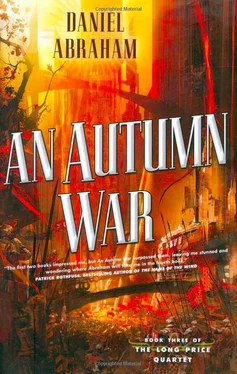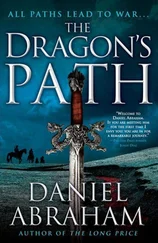Daniel Abraham - Autumn War
Здесь есть возможность читать онлайн «Daniel Abraham - Autumn War» весь текст электронной книги совершенно бесплатно (целиком полную версию без сокращений). В некоторых случаях можно слушать аудио, скачать через торрент в формате fb2 и присутствует краткое содержание. Жанр: Фэнтези, на английском языке. Описание произведения, (предисловие) а так же отзывы посетителей доступны на портале библиотеки ЛибКат.
- Название:Autumn War
- Автор:
- Жанр:
- Год:неизвестен
- ISBN:нет данных
- Рейтинг книги:4 / 5. Голосов: 1
-
Избранное:Добавить в избранное
- Отзывы:
-
Ваша оценка:
- 80
- 1
- 2
- 3
- 4
- 5
Autumn War: краткое содержание, описание и аннотация
Предлагаем к чтению аннотацию, описание, краткое содержание или предисловие (зависит от того, что написал сам автор книги «Autumn War»). Если вы не нашли необходимую информацию о книге — напишите в комментариях, мы постараемся отыскать её.
Autumn War — читать онлайн бесплатно полную книгу (весь текст) целиком
Ниже представлен текст книги, разбитый по страницам. Система сохранения места последней прочитанной страницы, позволяет с удобством читать онлайн бесплатно книгу «Autumn War», без необходимости каждый раз заново искать на чём Вы остановились. Поставьте закладку, и сможете в любой момент перейти на страницу, на которой закончили чтение.
Интервал:
Закладка:
"I'he poets," Liat said. "They have to kill the Galts. And they have to do it now."
Maati presented the meeting as a luncheon, a social gathering of old friends. He chose a balcony high in the palace looking out over the wide air to the south. The city lay below them, streets paved in black stone, tile and metal roofs pointing sharply at the sky. The towers rose above, only sun and clouds hanging higher. The wind was thick with the green, permeating scent of spring and the darker, acrid forge smoke. Between them, the low stone table was covered with plates-bread and cheese and salt olives, honeyed almonds and lemon trout and a sweetbread topped with sliced oranges. The gods alone knew where the kitchen had found a fresh orange.
Yet of all those present none of them ate.
Maati had made the introductions. Liat and Nayiit and Otah and Kiyan. The young man, Liat's son, had taken all the appropriate poses, said all the right phrases, and then taken position standing behind his mother like a bodyguard. Maati leaned against the stone banister, the sky at his hack. Otah-formal, uneased, and feeling more the Khai Machi than ever under the anxious gaze of woman who had been his lover in his youth-took a pose of query, and Liat shared the news that changed the world forever: the Galts had a poet of their own.
"His name is Riaan Vaudathat," Liat said. "He was the fourth son of a high family in the courts of Nantani. Ills father sent him to the school when he was five."
"This was well after our time," Nlaati said to Otah. "Neither of us would have known him. Not from there."
"He was accepted by the Dai-kvo and taken to the village to be trained," Liat said. "That was eight years ago. He was talented, well liked, and respected. The Dai-kvo chose him to study for the binding of a fresh andat."
Kiyan, sitting at Otah's side, leaned forward in a pose of query. "Don't all the poets train to hold andat?"
"We all try our hands at preparing a binding," Maati said. "We all study enough to know how it works and what it is. But only a few apply the knowledge. If the Dai-kvo thinks you have the temperament to take on one that's already hound, he'll send you there to study and prepare yourself to take over control when the poet grows too old. If you're bright and talented, he'll set you to working through a fresh binding. It can take years to be ready. Your work is read by other poets and the Daikvo, and attacked, and torn apart and redone perhaps a dozen times. Perhaps more."
"Because of the consequences of failing?" Kiyan asked. Maati nodded.
"Riaan was one of the best," Liat said. "And then three years ago, he was sent hack to Nantani. To his family. Fallen from favor. No one knew why, he just appeared one day with a letter for his father, and after that he was living in apartments in the Vaudathat holdings. It was a small scandal. And it wasn't the last of them. Riaan was sending letters every week hack to the Dai-kvo. Asking to be taken back, everyone supposed. He drank too much, and sometimes fought in the streets. By the end, he was practically living in the comfort houses by the seafront. The story was that he'd bet he could bed every whore in the city in a summer. His family never spoke of it, but they lost standing in the court. "There were rumors of father and son fighting, not just arguing, but taking up arms.
"And then, one night, he disappeared. Vanished. His family said that he'd been summoned on secret business. The Dai-kvo had a mission for him, and he'd gone the same day the letter had come. But there wasn't a courier who'd admit to carrying any letter like it."
"They might not have said it," Otah said. "They call it the gentleman's trade for a reason." ,, we thought of that," Nayiit replied. He had a strong voice; not loud, but powerful. "Later, when we went to the Dai-kvo, I took a list of the couriers who'd come to Nantani in the right weeks. None of them had been to the I)ai-kvo's village at the right time. The Dai-kvo wouldn't speak to me. But of the men who would, none believed that Riaan had been sent for."
Otah could still think of several objections to that, but he held them hack, gesturing instead for Liat to go on.
"No one connected the disappearance with a Galtic merchant ship that left that night with half her cargo still waiting to he loaded," Liat said. "Except me, and I wouldn't have if I hadn't made it my business to track all things Galtic."
"You think he was on that ship?" Otah said.
"I'm certain of it."
"Why?" he asked.
"The wealth of coincidences," Liat said. "The captain-Arnau Fentin-was the second brother of a family on the Galtic High Council. A servant in the Vaudathat household saw Riaan's father burning papers. Letters, he said. And in a foreign script."
"Any trade cipher could look like a foreign script," Otah said, but Liat wouldn't be stopped.
"The ship had been hound for Chaburi-"Ian and then Bakta. But it headed west instead-hack to Galt."
"Or Eddensea, or Eymond."
"Otah-kya," Kiyan said, her voice gentle, "let her finish."
Ile saw Liat's gaze flicker toward her, and her hands take a pose of thanks. He leaned hack, his palms flat on his thighs, and silently nodded for Liat to continue.
"There were stories of Riaan having met a new woman in the weeks before he left. That was what his family thought, at least. He'd spent several evenings every week at a comfort house whose hack wall was shared with the compound of House Fentin. The captain's family. I have statements that confirm all of this."
"I went to the comfort house myself," Nayiit said. "I asked after the lady Riaan had described. "There wasn't anyone like her."
"It was a clumsy lie," Liat said. "All of it from beginning to end. And, Itani, it's the Galts."
Whether she had used his old, assumed name in error or as a ploy to make him recall the days of his youth, the effect was the same. Otah drew a deep breath, and felt a sick weight descend to his belly as he exhaled. He had spent so many years wary of the schemes of Galt that her evidence, thin as it was, almost had the power to convince him. He felt the gazes of the others upon him. Mlaati leaned forward in his seat, fingers knotted together in his lap. Kiyan's rueful half-smile was sympathetic and considering both. The silence stretched.
"Is there any reason to think he would have… done this?" Otah asked. "I'he poet. Why would he agree to this?"
Liat turned and nodded to her son. The man licked his lips before he spoke.
"I went to the I)ai-kvo's village," Nayiit said. "My mother, of course, couldn't. "There were stories that Riaan had suffered a fever the winter before he was sent away. A serious one. Apparently he came close to death. Afterward, his skin peeled like he'd been too long in the sun. They say it changed him. He became more prone to anger. He wouldn't think before he acted or spoke. The Dai-kvo sat with him for weeks, training him like he was fresh from the school. It did no good. Riaan wasn't the man he'd been when the I)ai-kvo accepted him. So…"
"So the Dai-kvo sent him away in disgrace for something that wasn't his fault," Otah said.
"No, not at first," Nayiit said. "The Dal-kvo only told him that he wasn't to continue with his binding. That it was too great a risk. They say Riaan took it poorly. There were fights and drunken rants. One man said Riaan snuck a woman into the village to share his bed, but I never heard anyone confirm that. Whatever the details, the Dai-kvo lost patience. He sent him away."
"You learned quite a lot," Otah said. "I'd have thought the poets would he closer with their disgraces."
"Once Riaan left, it wasn't their disgrace. It was his," Nayiit said. "And they knew I had come from Nantani. I traded stories for stories. It wasn't hard."
"The Dai-kvo wouldn't meet with us," Liat said. "I sent five petitions, and two of them his secretaries didn't even bother to send refusals. It's why we came here."
Читать дальшеИнтервал:
Закладка:
Похожие книги на «Autumn War»
Представляем Вашему вниманию похожие книги на «Autumn War» списком для выбора. Мы отобрали схожую по названию и смыслу литературу в надежде предоставить читателям больше вариантов отыскать новые, интересные, ещё непрочитанные произведения.
Обсуждение, отзывы о книге «Autumn War» и просто собственные мнения читателей. Оставьте ваши комментарии, напишите, что Вы думаете о произведении, его смысле или главных героях. Укажите что конкретно понравилось, а что нет, и почему Вы так считаете.










